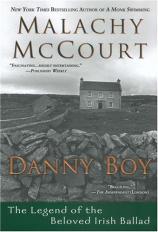Danny Boy: The Beloved Irish Ballad
Review
Danny Boy: The Beloved Irish Ballad
Beyond question, the melody variously known as "Danny Boy" or
"Londonderry Air" is one of the great tunes of all time. Its
measured rising and falling cadences would grace the catalog of
Franz Schubert or any of the other great classical vocal
composers.
Malachy McCourt, brother of novelist Frank McCourt (ANGELA'S ASHES)
and a well-known writer and radio-TV luminary in his own right, has
produced a curious little book of less than 95 pages about the
famous tune and its well-known lyrics. His book is part history,
part speculation, part myth and part personal editorial essay. And
it is not free from touches of Irish blarney.
McCourt's findings may surprise --- and dismay --- many. The great
tune, long since adopted as a kind of unofficial Irish national
anthem, may not be of Irish origin. A folklorist named Jane Ross
supposedly first noted it down around 1851. She reportedly heard it
played by a blind fiddler, Jimmy McCurry, in Limavady, Londonderry
--- but there is at least a possibility that the melody may have
originated in Scotland. No one knows for sure. At least one
respected musical scholar claims that the tune follows no known
metric scheme for Irish folk music.
Many different sets of words were attached to the tune after its
first publication in 1855 --- but those that have become
indissolubly identified with it ("O Danny boy, the pipes, the pipes
are calling, from glen to glen and down the mountainside....") were
written in 1910 by an English lawyer and song-lyric cobbler named
Frederick E. Weatherly, who probably never set foot in Ireland.
They were actually intended for a different tune, but when
Weatherly's sister-in-law sent him some years later the familiar
melody from her home in Australia, he saw that it was a perfect fit
for his earlier verses. Thus an "Irish" classic was created from a
melody that may be Scottish and words by an Englishman.
McCourt gives us this information straightforwardly enough, but he
fleshes them out with a good deal of barely relevant material. It
seems strange to arraign a book of 95 pages on charges of padding,
but the complaint seems justified. McCourt solicited opinions about
the song from Irish celebrities (including brother Frank) and
speculates at length on such side issues as who is singing the song
and to whom it is addressed (one possibility among several: it is
the song of Danny Boy's gay lover!). The author's tone varies
between straight historical writing and folksiness, including
occasional cutesy use of "tis" and "t'was." McCourt also grinds a
personal axe or two. He thinks ill of those Catholic dioceses that
have banned the singing of "Danny Boy" at funerals because it is
"secular."
There are some fascinating bits of trivia here, however. Victorians
hesitated to refer to the song as Londonderry Air because, to their
prudish ears, it sounded too much like "London derriere." Irish
nationalists never use that title either, because they want no
mention of London in the title. Wordsmith Weatherly was once in
legal partnership with one of the sons of Charles Dickens. And
another of Weatherly's lyrics was the popular "Roses of Picardy,"
set to music memorably by Haydn Wood. Wood studied under the
composer Sir Charles Stanford, who quoted "Londonderry Air" in one
of his Irish rhapsodies. Make of that what you will. This is a
curious little book, entertaining in its quirky way but almost
undone by its relentless folksiness. "Londonderry Air" remains a
musical treasure, regardless of its origin.
Reviewed by Robert Finn (Robertfinn@aol.com) on January 21, 2011
Danny Boy: The Beloved Irish Ballad
- Publication Date: February 4, 2003
- Genres: Nonfiction
- Paperback: 118 pages
- Publisher: NAL Trade
- ISBN-10: 0451208064
- ISBN-13: 9780451208064



